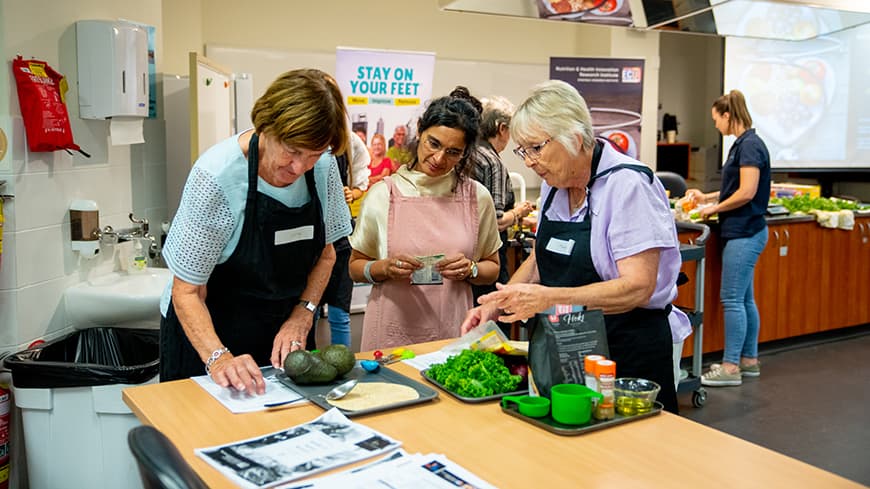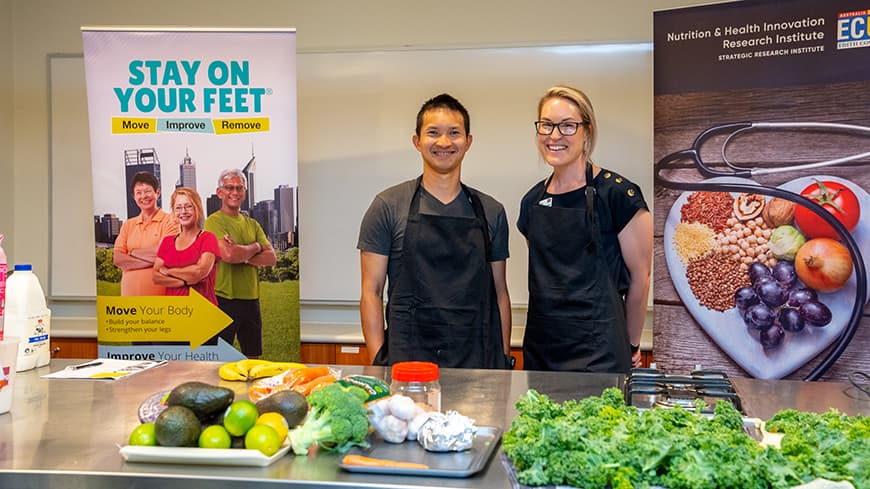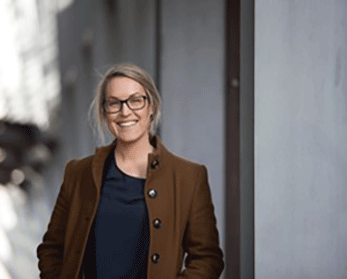Researchers are constantly growing their understanding of how nutrition affects various aspects of our lives, however it is just as important people have the know-how required to put these learnings into practice.
ECU's Nutrition and Health Innovation Research Institute recently held a unique workshop to teach the community what to eat to improve muscle, bone and vascular health — and how to prepare the meals.
Recent ECU research has shown the role nutrition can have on bone fracture risk, blood vessel health and heart health.
 Dr Tas Masih (centre) facilitated the workshop.
Dr Tas Masih (centre) facilitated the workshop.
NHIRI partnered with not-for-profit Injury Matters' Stay on Your Feet program, which was launching its Improve Your Health campaign which aims to promote key messages such eating nutritious food in order to stay strong and active to prevent falls.
Members of the community aged over 60 learned to cook meals such as beetroot pancakes, grilled fish tacos with kale slaw, and "chocolatey cruciferous ice-cream".
While attendees enjoyed the meals, Dr Marc Sim, Dr Lauren Blekkenhorst, Dr Tas Masih and PhD candidate Montana Dupuy then explained the nutritional benefits before the guests took home a cookbook with a dozen healthy recipes.
 Dr Marc Sim and Dr Lauren Blekkenhorst.
Dr Marc Sim and Dr Lauren Blekkenhorst.
Organised by NHIRI strategic initiatives and operations manager Cheryl Croce and supported by laboratory technician Kim Luu, participants said they benefited greatly from the workshop.
Positive feedback ranged from learning new recipes, to understanding how diet can improve health.
"I was surprised at how nice certain vegies are to taste when used in recipes we tried today, which will be tried at home," one attendee said.
Another participant remarked how she could now better address her elevated cholesterol.
"I realise by making a small change in my diet I can improve it," she said.
 Participants learned why particular foods are important for health later in life.
Participants learned why particular foods are important for health later in life.
"I am challenged to find new and interesting ways to eat a wider variety of vegetables, but the camaraderie of the day was excellent, with everyone working together to make interesting, tasty food.
"I loved the broccoli ice-cream!"
Dr Sim said it was important health research was accompanied by practical messaging people could implement.
"NHIRI has developed evidence around specific foods for muscle, bone and vascular health, and it's important to translate this for people," he said.
"It’s one thing to tell them what to eat, it's another to tell them why they need to eat these foods and how to prepare them."
 Attendees took home a recipe book so they could recreate the meals in their own kitchens.
Attendees took home a recipe book so they could recreate the meals in their own kitchens.
He said it was important people knew about advancements in our understanding of nutrition, particularly as we age.
"Traditionally, muscle and bone benefits from diet have been all about calcium and vitamin D, but there’s more to nutrition than that," he said.
"Eating well doesn't have to be difficult: it can be simple, quick and tasty while also allowing us to age in a healthy way."

 Attendees learned how to make healthy and tasty meals based on nutrition research.
Attendees learned how to make healthy and tasty meals based on nutrition research.




